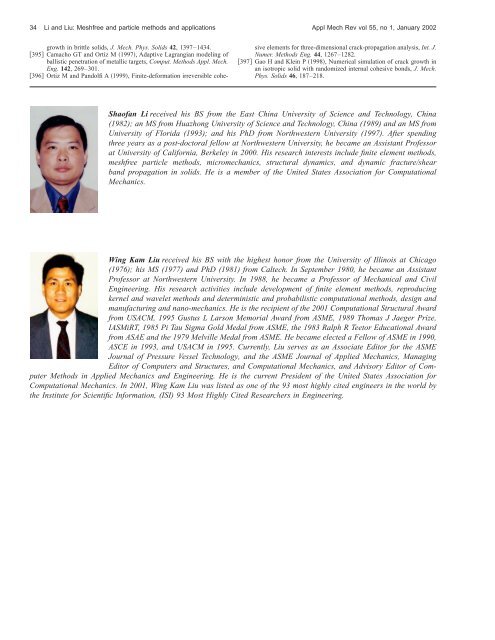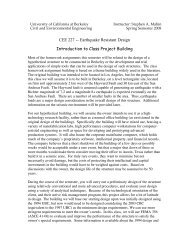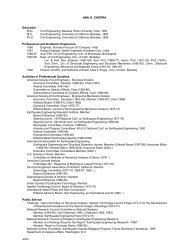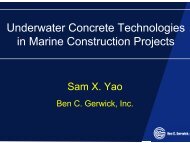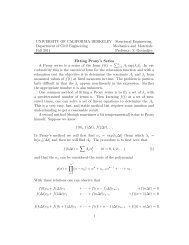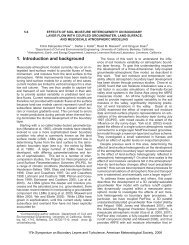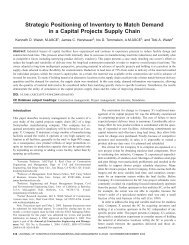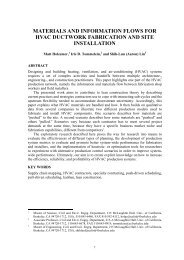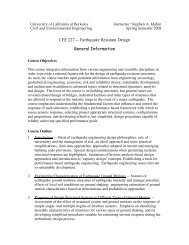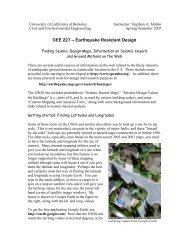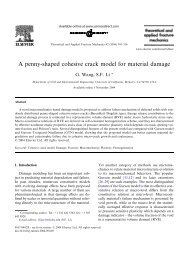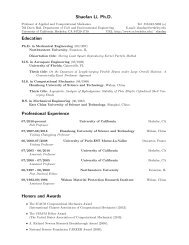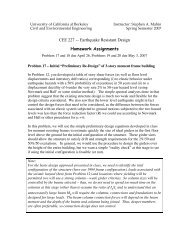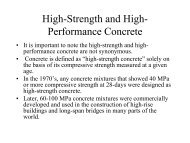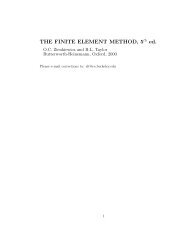Meshfree and particle methods and their applications - TAM ...
Meshfree and particle methods and their applications - TAM ...
Meshfree and particle methods and their applications - TAM ...
Create successful ePaper yourself
Turn your PDF publications into a flip-book with our unique Google optimized e-Paper software.
34 Li <strong>and</strong> Liu: <strong>Meshfree</strong> <strong>and</strong> <strong>particle</strong> <strong>methods</strong> <strong>and</strong> <strong>applications</strong> Appl Mech Rev vol 55, no 1, January 2002<br />
growth in brittle solids, J. Mech. Phys. Solids 42, 1397–1434.<br />
395 Camacho GT <strong>and</strong> Ortiz M 1997, Adaptive Lagrangian modeling of<br />
ballistic penetration of metallic targets, Comput. Methods Appl. Mech.<br />
Eng. 142, 269–301.<br />
396 Ortiz M <strong>and</strong> P<strong>and</strong>olfi A 1999, Finite-deformation irreversible cohesive<br />
elements for three-dimensional crack-propagation analysis, Int. J.<br />
Numer. Methods Eng. 44, 1267–1282.<br />
397 Gao H <strong>and</strong> Klein P 1998, Numerical simulation of crack growth in<br />
an isotropic solid with r<strong>and</strong>omized internal cohesive bonds, J. Mech.<br />
Phys. Solids 46, 187–218.<br />
Shaofan Li received his BS from the East China University of Science <strong>and</strong> Technology, China<br />
(1982); an MS from Huazhong University of Science <strong>and</strong> Technology, China (1989) <strong>and</strong> an MS from<br />
University of Florida (1993); <strong>and</strong> his PhD from Northwestern University (1997). After spending<br />
three years as a post-doctoral fellow at Northwestern University, he became an Assistant Professor<br />
at University of California, Berkeley in 2000. His research interests include finite element <strong>methods</strong>,<br />
meshfree <strong>particle</strong> <strong>methods</strong>, micromechanics, structural dynamics, <strong>and</strong> dynamic fracture/shear<br />
b<strong>and</strong> propagation in solids. He is a member of the United States Association for Computational<br />
Mechanics.<br />
Wing Kam Liu received his BS with the highest honor from the University of Illinois at Chicago<br />
(1976); his MS (1977) <strong>and</strong> PhD (1981) from Caltech. In September 1980, he became an Assistant<br />
Professor at Northwestern University. In 1988, he became a Professor of Mechanical <strong>and</strong> Civil<br />
Engineering. His research activities include development of finite element <strong>methods</strong>, reproducing<br />
kernel <strong>and</strong> wavelet <strong>methods</strong> <strong>and</strong> deterministic <strong>and</strong> probabilistic computational <strong>methods</strong>, design <strong>and</strong><br />
manufacturing <strong>and</strong> nano-mechanics. He is the recipient of the 2001 Computational Structural Award<br />
from USACM, 1995 Gustus L Larson Memorial Award from ASME, 1989 Thomas J Jaeger Prize,<br />
IASMiRT, 1985 Pi Tau Sigma Gold Medal from ASME, the 1983 Ralph R Teetor Educational Award<br />
from ASAE <strong>and</strong> the 1979 Melville Medal from ASME. He became elected a Fellow of ASME in 1990,<br />
ASCE in 1993, <strong>and</strong> USACM in 1995. Currently, Liu serves as an Associate Editor for the ASME<br />
Journal of Pressure Vessel Technology, <strong>and</strong> the ASME Journal of Applied Mechanics, Managing<br />
Editor of Computers <strong>and</strong> Structures, <strong>and</strong> Computational Mechanics, <strong>and</strong> Advisory Editor of Computer<br />
Methods in Applied Mechanics <strong>and</strong> Engineering. He is the current President of the United States Association for<br />
Computational Mechanics. In 2001, Wing Kam Liu was listed as one of the 93 most highly cited engineers in the world by<br />
the Institute for Scientific Information, (ISI) 93 Most Highly Cited Researchers in Engineering.


